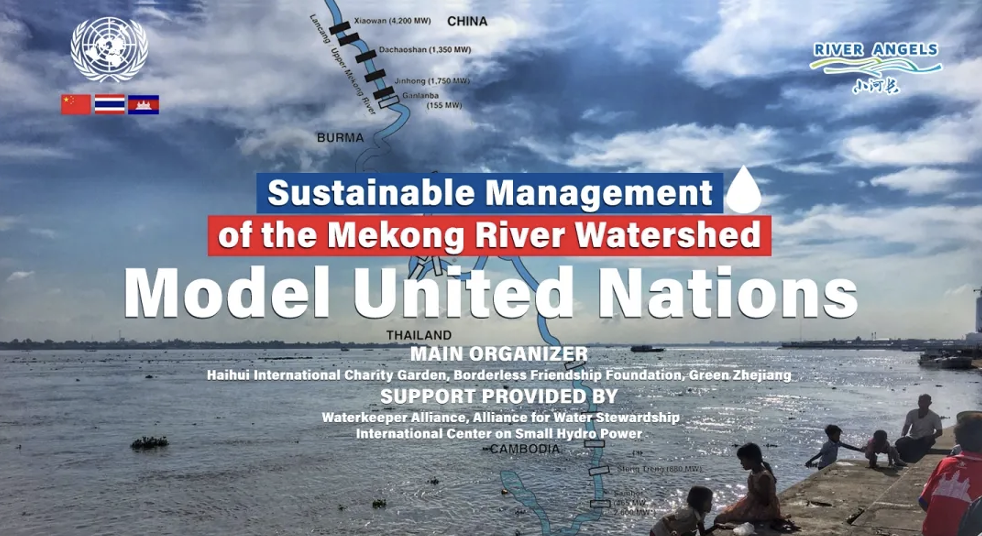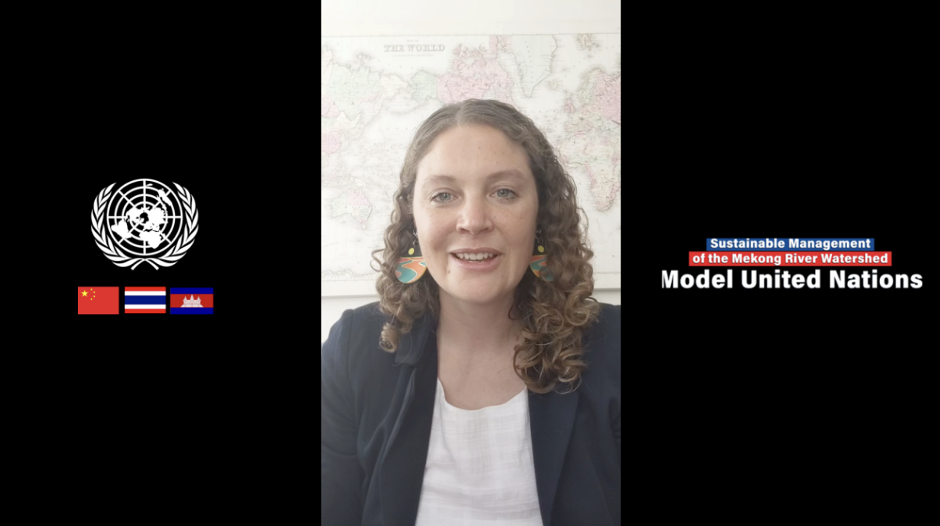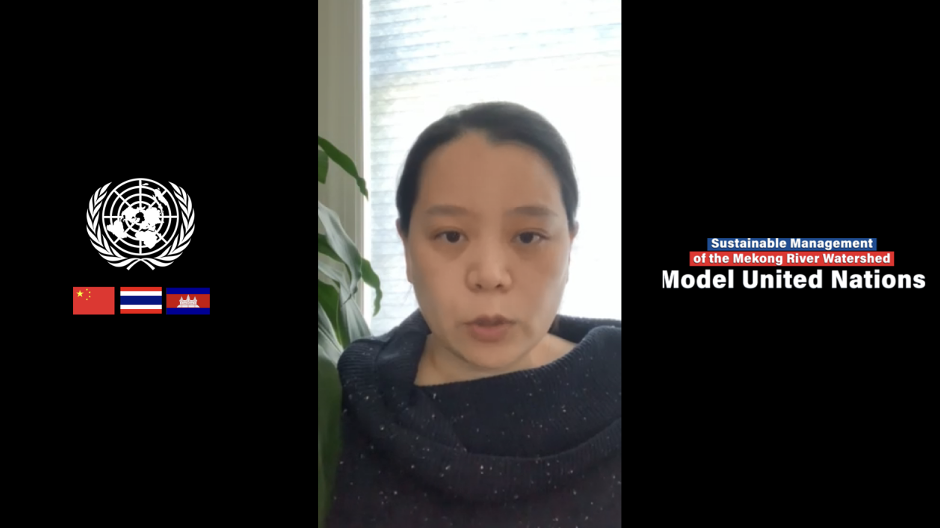Sustainable Mekong: Middle School Students from Three Countries along the Mekong River Carry Out Model United Nations Event
(Report submitted by RCE Hangzhou)
 Recently, an online Model United Nations event on 'Sustainable Management of the Mekong River Watershed' was launched by RCE Hangzhou, Qiantang River Waterkeeper China, Tonle Sap Lake Waterkeeper Cambodia, Haihui Charity Park Thailand and Borderless Friendship Foundation Thailand. The Waterkeeper Alliance, Alliance for Water Stewardship, and International Center on Small Hydro Power (INSHP) provided scientific support for this event. Participating in the event were 12 middle school students who were selected from Hangzhou Xuejun High School (China), CIA First International School (Cambodia), and Chiang Rai International Christian School (Thailand).
Recently, an online Model United Nations event on 'Sustainable Management of the Mekong River Watershed' was launched by RCE Hangzhou, Qiantang River Waterkeeper China, Tonle Sap Lake Waterkeeper Cambodia, Haihui Charity Park Thailand and Borderless Friendship Foundation Thailand. The Waterkeeper Alliance, Alliance for Water Stewardship, and International Center on Small Hydro Power (INSHP) provided scientific support for this event. Participating in the event were 12 middle school students who were selected from Hangzhou Xuejun High School (China), CIA First International School (Cambodia), and Chiang Rai International Christian School (Thailand).
The Mekong River is a trans-boundary river in East Asia and Southeast Asia. This river originates from the northeastern slope of the Tanggula Mountains in Qinghai province. It is called the Mekong River in the range of the Indo-China Peninsula, while it is known as the Lancang River in China. The main stream of this river is estimated at 4,909 kilometers long. It is the seventh longest river in Asia and the tenth longest in the world. From the Tibetan Plateau, the river runs through China, Myanmar, Laos, Thailand, Cambodia, and Vietnam. It is the most important transnational water system in Asia. At present, the environmental issues represented by the Lancang-Mekong River has become or is becoming one of the important factors affecting international relations, not only involving one or two countries, but also the entire region. If this cross-border environmental problem is not properly resolved, it will inevitably affect the bilateral or multilateral cooperation between countries. The development of the Lancang-Mekong River Basin should become a pioneer of the new model development of the world's major rivers, especially the international major rivers, that is, focusing on environmental protection issues. With this opportunity, Model United Nations aims to better promote the protection of the Mekong River Basin and cultivate the concept of sustainable development education.
 In the practice activities, middle school students from three different countries, China, Thailand and Cambodia, focused on the agenda of Model United Nations, and the need to determine how to promote the water conservancy facilities of the upper Mekong River in order to realise the rational distribution of water resources without affecting the water rights of the countries in the basin, and also determine how all the countries can participate in the project of the Mekong River Basin. Moreover, they discovered that eco-environmental protection is the one of the two major issues to achieve sustainable development of the river basin.
In the practice activities, middle school students from three different countries, China, Thailand and Cambodia, focused on the agenda of Model United Nations, and the need to determine how to promote the water conservancy facilities of the upper Mekong River in order to realise the rational distribution of water resources without affecting the water rights of the countries in the basin, and also determine how all the countries can participate in the project of the Mekong River Basin. Moreover, they discovered that eco-environmental protection is the one of the two major issues to achieve sustainable development of the river basin.
During the discussion, these students believed that the development and utilisation of water resources of the Mekong River, the safety of waterways, and the ecological and environmental protection of the Mekong River Basin are very important in regional and international mechanisms for promoting peace, stability and development within and outside the region. They appealed and put forward specific countermeasures from nine aspects including policy and political cooperation, water quality, infrastructure construction, water flow, flood and drought, waterway safety, recreation and leisure, water conservation and environmental protection, and agriculture.
 Through the Model United Nations activities, the students could understand that political mutual trust among countries is being deepened with the cooperation of countries, and the cooperation of countries in various fields has been developing healthily. The students think that it is necessary to further strengthen the cooperation between these three countries and improve the people's livelihood in Mekong, so as to jointly cope with the economic, social and environmental challenges facing the region.
Through the Model United Nations activities, the students could understand that political mutual trust among countries is being deepened with the cooperation of countries, and the cooperation of countries in various fields has been developing healthily. The students think that it is necessary to further strengthen the cooperation between these three countries and improve the people's livelihood in Mekong, so as to jointly cope with the economic, social and environmental challenges facing the region.
The students said that in practice, countries should communicate and consult more with each other, and uphold the spirit of openness and tolerance. Countries should cooperate on the basis of consensus, equality, consultation and coordination, voluntary participation, joint contribution, and sharing. Moreover, it is also important for every country to respect the Charter of the United Nations and international law.
Megan McLeod, CEO of Alliance for Water Stewardships Australia gave a speech for this event. She expressed her appreciation for organising such a great event. She said that these students represented the whole region and generation, and their initiative and enthusiasm to understand how the world works is invaluable. Megan believed that the skills students developed in this event, such as critical thinking and seeing things from different perspectives in a worldview are so important. She also encouraged the students to keep interested, keep informed and continue to actively participate in such an event.
 Lastly, Min Zheng, Senior Organizer Asia of Waterkeeper Alliance, expressed her gratitude to all the participants involved in this event. Min said, she was glad that the sustainable development of the Mekong river watershed is taking place in the World Water Day these days. She provided a suggestion regarding how to develop cooperation between three countries, China, Thailand and Cambodia on sustainable management is extremely important as the Mekong river watershed is an important water system in Asia, especially for these three countries. Min concluded the discussion into two topics: the first was on how upstream water infrastructure can be used to promote reasonably the distribution of water resources and minimising flood risks without negatively affecting water resources and benefiting the countries, and the second topic is how can the main country take part in protecting the river's ecology and achieve the sustainable development of the main con-river watershed. She suggested some activities which can be organised in future may include but not limited to the determination of topic discussion, formal statement and informal debating discussion, drafting a revolution, and commentary by professionals. She hoped that through this opportunity, the participants could provide effective solutions, with all the countries coming to a consensus of promoting sustainable development, just like the water keepers across the globe are doing in protecting our watershed.
Lastly, Min Zheng, Senior Organizer Asia of Waterkeeper Alliance, expressed her gratitude to all the participants involved in this event. Min said, she was glad that the sustainable development of the Mekong river watershed is taking place in the World Water Day these days. She provided a suggestion regarding how to develop cooperation between three countries, China, Thailand and Cambodia on sustainable management is extremely important as the Mekong river watershed is an important water system in Asia, especially for these three countries. Min concluded the discussion into two topics: the first was on how upstream water infrastructure can be used to promote reasonably the distribution of water resources and minimising flood risks without negatively affecting water resources and benefiting the countries, and the second topic is how can the main country take part in protecting the river's ecology and achieve the sustainable development of the main con-river watershed. She suggested some activities which can be organised in future may include but not limited to the determination of topic discussion, formal statement and informal debating discussion, drafting a revolution, and commentary by professionals. She hoped that through this opportunity, the participants could provide effective solutions, with all the countries coming to a consensus of promoting sustainable development, just like the water keepers across the globe are doing in protecting our watershed.
Photos: (in order): Event poster; Students from different countries are sharing their opinions during the discussion; Megan McLeod, CEO of Alliance for Water Stewardships Australia; Min Zheng, Senior Organizer Asia of Waterkeeper Alliance. All photo credits: RCE Hangzhou.


